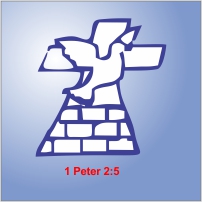The Hippodrome
- Details
- Category: Teachings & Articles
- Published: Wednesday, 27 September 2017 04:50
- Hits: 5751
The Hippodrome
By Augusto A. Kho
September 5, 2017 (Tuesday); 2:14 A.M.
Updated: September 09, 2017 (Saturday); 11:31 A.M.
Updated: September 13, 2017 (Wednesday); 12:15 A.M.
Balungao District Jail – BJMP; September 25, 2017 (Monday); 10:00 A.M.
We are into like horse- racing. We are racing with time. We are racing with God's judgment. We are racing with our future's destiny
(pciture1)
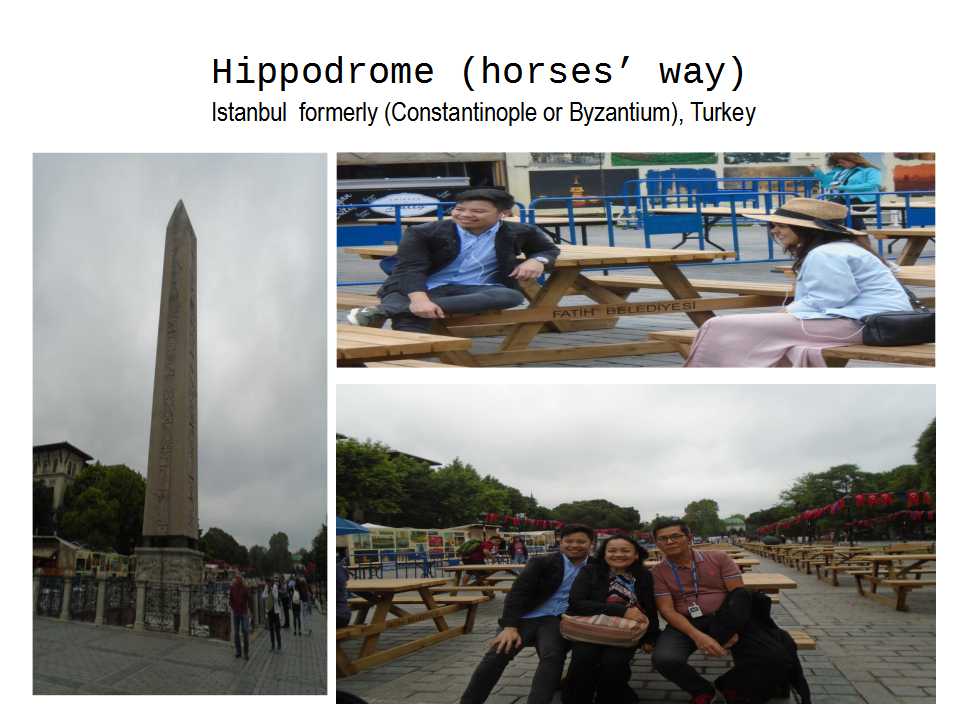
Colosseum & Hippodrome
In 1985, I had the chance to visit ancient Rome. It is a huge place a centre of the Imperial Rome where I saw the inscription of the name, “Augustus Caesar.” Such is a title more than a name and it is being addressed to an emperor. On the eastern side of that capital is where the Colosseo (Colesseum) is and not far from there is the Arch of Titus (a monument of former emperor) which is an emblem of victory during the 1st Roman –Jewish War that burned the entire Temple of Solomon in 70 A.D. as Christ prophesied in Matthew 24:2.
Not until this year when we visited ancient Constantinople (Byzantine or Neo-Rama) now called, Istanbul. Constantinople was the centre of the Roman Empire during that time under the reign of Emperor Constantine. That is where the Hippodrome, a Greek two-words meaning, “Horse’s Way.” It is a place meant for “charioteers’ competition.” It was rebuilt during that time to accommodate at least 100,000 people.
The word “Hippodrome” (horse’s way) came to my mind last September 5, 2017, on a Tuesday 2:14 A.M. and from there I immediately pictured in my mind the Hippodrome in ancient city of Constantinople (Turkey) as well the Colesseo in ancient Rome.
Though both Hippodrome and Colosseo are meant for competition but each one has a distinct character. The Hippodrome in ancient Byzantine was later adorned by a Serpentine Column taken from the Temple of Apollo from Delphi, Greece (which I personally saw and visited) that showcasing this ancient city as the capital of the Roman Empire. When Theodosius, another Christian Emperor came into power after Constantine, he reconstructed this “horse’s way” so that it can hold at least 100,000 spectators should the Hellenistic horse-racing will be held in this ancient city.
(picture2)
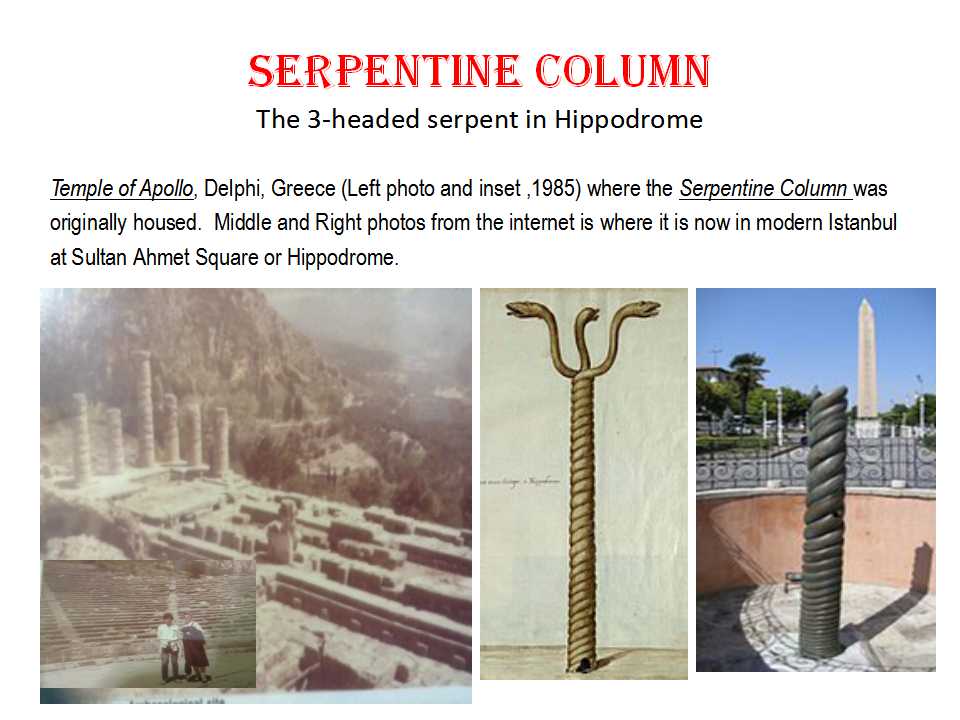
Also the Lord reminded me how the ancient Christians walked and placed like a beasts in a Colosseo as a form of entertainment to the lunatic frenzy shouts of lunatic Roman spectators. That is related to Hebrews 12:1, “Wherefore seeing we also are compassed about with so great a cloud of witnesses, let us lay aside every weight, and the sin which doth so easily beset us, and let us run with patience the race that is set before us.”
Colosseum and Arch of Titus
As myself saw this ruins of this Colosseum or Amphitheatrum Flavium in ancient Rome (now Italy) in 1985. The Colosseum was built by Emperor Octavian in 72 AD and complete in 80 AD during the reign of Emperor Titus. Here in this amphitheatre display the uncompromising Christians who refused to pay respect to the Roman Emperor as Pontifex Maximus (Highest Priest) were thrown into gladiatorial games until they bleed to death as martyrs.
While Hippodrome and Colosseum are places for competition and games the latter has a distinct character of being a place for execution.
Stage-fright or Limelight
There are times God will bring you out from your own cocoon and bring you at the spotlight.
That is true in the life of a simple shepherd boy named David. He used to be a simple boy whose life is centred in a small farmland where he tends his father’s flock. Probi as we call it. Taga probinsiya. Not until Jesse, his father sent him for an errand to bring loaves of bread and cheese to his two older siblings who were in the battlefront against the Philistines.
From there he found the badmouthed Goliath who cursed his Living God that offended him that much. So offered himself to King Saul and David confronted in a battle this cussing giant who stands over 9 feet tall. While David was merely armed with a slingshot with 5 smooth five (5) stones, Goliath was completely dressed up in metal armour. It is a spiritual and earthly battle. A battle of God and battle of men. While Goliath boasted on his gargantuan size, David boasted in the Name of the Lord. David slew Goliath for badmouthing the Almighty God. David took his head off much to the dismay and fear from the side of Philistine. And on the valley of Elah where the Israelites were encamped when Goliath was killed that David gained a celebrity status (1 Samuel 17:2, 19).
(picture3)

Jewish women danced on the street for David’s victory. Men’s eyes fastened on David with awe and admiration. But for King Saul, he found a competitor who is a present and clear danger, a threat to his throne. From that time on, King Saul eyed on David with jealousy and hate. Until Paul started haunting David like a defenceless deer. From the limelight or spotlight, David hid himself on the dark, just like on the backstage running for his life that is why someone composed a beautiful song that goes like this:
“As the deer, panteth for the water, so my soul longeth after Thee, you alone are my heart’s desire and I will worship Thee, You alone are my strength my shield, to you alone, is my spirit yield, you alone are my heart’s desire and I longeth to worship Thee.”
That is a song of desperation. A song of clemency. That was taken from Psalms 42:1-2.
In one moment, the crowd will cheer you up. For another moment, you feel you are alone and those who applauded you will end up a mere spectator while you’re struggling for survival.
There are times you were up. There are times you were down. And you simply doesn’t know where to go to draw strength from.
David faces the darkest moment of his life. His wife Michael berated him. His men turned their backs on him. Saul his father in law was determined to kill him. The only consoling man whom he could turn to is his friend Jonathan but later died in a battle. He was alone then. But David has a God where he could draw his last strength.
Great Falling Away
The author of the Book of Hebrews is being attributed to Saint Paul due with the style of its writing and it is being addressed to Hebraic-Christians who are “falling away” and going back to their old, religious practices due to severe persecution.
The words, “falling away”: mentioned in 2 Thessalonians 2:3 refer to the Greek word, “apostasia” i.e. “defection” or “apostasy” in the same way that Judas defected Christ for 30 pieces of silver (and it wasn’t even gold coins). From here we see again how precious metals can betray the Son of God much more now that the whole world have gone too materialistic.
Defection in Tagalog is ill-sounding words, “traydor.”
Perhaps I was the only pastor in Pangasinan who had a head-on collision against politicians in the province. When a politician sued me in a court for a criminal case, my first court appearance was like a feast when over 20 pastors’ presence gave me a big boast. The two criminal cases were dragged for over two (2) years and I was left alone. I often haunted with regret, self-pity and fear.
I could easily place myself to David’s place when he was being haunted by a powerful man of authority. While others perhaps dream to be popular and to be on the spotlight to gain power, prestige and title, I always dreaded that! I often say, “It is lonely out there!” Like David who were applauded for celebrity-status for a time, spent many years of his life running like a fugitive. He may be a ‘champion’ from others’ eyes, but deep inside he is cowed with fear and uncertainty.
It is when you are in that battle of self and in battle of the enemy that places you as an object of entertainment. While many if not most are spectators who are watching you like a movie. No! They won’t lend you a hand. They were there merely to watch to entertain themselves.
In every game, they are only two main characters – the athlete and the spectator. Choose where you belong to.
That is where hippodrome comes. Hippodrome is a battlefield where our fight for life is placed on display for public view. While others placing their thumps up, others will give us a sign of “thumbs down.” A true Christian means to be a spectacle where your Christian walk will be on displayed to be tested. Like David, though trained as a warrior who defeated the giant Goliath did not exercise arrogance against Saul who sought to kill him. He would rather run for his life than to shed blood. Even when God gave David an opportune time to place revenge on his hand, he still refuse to pay evil for an evil. David’s heart is humbled before God (1 Samuel 24:1-7/ NLV). Why David refused to slay Saul, his enemy? Because he valued life.
YOU, how much you value life?
To the Roman spectators and the bloodthirsty Imperial Cult of Rome have no regard to human life especially to the slaves and Christians who refuses to worship the Emperor. I saw the ruins myself in the catacombs and Colosseo in Rome as well to Smyrna in Asia Minor where martyr Polycarp was imprisoned and prosecuted.
Much more when you are a drug-addicts and drug-suspects, prostitutes, impoverished poor, unlearned, scum, and others, how much others will value your life?
The value of life
How do we value human life is how we value the very Maker who created man.
Even Christ Himself revealed that God and the heaven rejoice for one sinner that repents (Luke 15:10) even though he is a drug-addict.
“O Lord, you have searched me and known me. You know my sitting down and my raising up. You understand my thought afar off. You comprehend my path and my lying down, and are acquainted with all my ways … You formed my inward parts, you covered me in my mother’s womb. I will praise you, for I am fearfully and wonderfully made. Marvelous are your works and my souls knows very well. My frame was not hidden from you.” Psalm 139:1-3,13-15.
Man is wonderful
Man is distinctly separated from other beasts and creation. David claimed that man is “wonderfully made.” That “wonderful” in Hebrew “palah” means “set apart” for God. Why? Because man is the very image or resemblance of God. To err against man is to offend God Himself according to Genesis 1:26.
How man wonderfully made?
The human eyes can distinguish 8-Million colors. Ears consisting of 20,000 hair scanners can discern 300,000 tones. Circulatory system is 60 – 100 miles long. The heart pumps 5 quarts of blood/minute or 2,000 gallons/day. We produce 1 Billion of cells everyday and this develops to 200 miles of capillaries for every pound of body fat. The muscular fat system consist of 600 muscles that can lifts 25 tons if used together. Our nervous system has 100 Million nerves, having 1,300 nerve endings on every square inch of finger tip that send touch sensations to the brain at the rate of 350 feet/second.
The human anatomy has 206 bones. Digestive tract 30 feet long. Air sacs consisting of 6,000 breathing 2,400 gallons of air daily. The skin contains 19M cells; 625 sweat glands; 65 kinds of hairs; 19,000 sensory cells. The stomach with acid powerful enough to dissolve a razor blade.
The brain weighs 3lbs. containing 100 Billion neurons and each neuron as small as computer chip. The brain has 100,00 chemical reactions occurring every second. The nerve cells sending impulses to the body at the rate of 200 miles/second. The brain stores 10-15 Trillion memories in a life-time. (Source: “The Lord’s Trumpet” Vol. Xiv, No. 10, October 2004)
A man’s worth
How much is your worth as a person? To an accountant, he estimates a man on the basis of gross income vs. net income.
Nobody could ever estimate your worth as a person? Perhaps some estimations will do like how much it cost for the human’s chemical composition? And how an economist estimates human life? What about the Congress of the Philippines how much is your worth to them? In God’s eyes, how much He will fare you?
A biochemist estimate
Harold J. Morowitz, Yale University, Biochemist calculated the exact value of human body in tems of chemical composition alone – hemoglobin $285/gram; insulin $47.50/gram; DNA $76/g; collagen $15/g; Alkaline phosphate $225/gram; among others. The most expensive is Bradykinin i.e. amino acid at $12,000/gram; follicle-stimulating hormone $8M /gram; proclactin, hormone-stimulating female male production at $17.5M/gram. When calculated with average value per human body at $245.54 (multiply by dry weight of 68% body of water) amounting to $6,000,015 total $6 Million. (Source: Book entitled, “alive,” by S. Rickly Christian).
An economist estimate
The conservative estimate for the value of entire biosphere is $ 54 Trillion per year that provides me and you free worth of materials like air, water, food, medicines, lumber, heat, energy and others says a teams of ecologists and economists by National Center of Ecological Analysis and Synthesis of Sta. Barbara, California led by Robert Constanza of the University of of Maryland.
The free earth resourcing of %54-Trillion a year dwarfed the global GNP of merely $18 Trillion per year in terms of goods and services according to Constanza (1997).
Since the entire biosphere’s resources is God-made according to Genesis chapter 1, God’s incomparable expression of generosity and love to mankind have been bestowed to Adam and Eve in Genesis 1:28. If you subdivide this $54-trillion wealth to Adam and Eve on a yearly basis, one man is worth $27-Trillion.
A government official estimate
Let us check how the Philippine Government particularly the House of Representatives who claim that they are representing the Filipinos in their district. Let’s read this news:
“P1,000-budget for CHR? How did your Reps vote? Here’s a partial list – and why there’s no full list (yet):By News5-InterAksyon | September 12, 2017, 7:23 PM . The House of Representatives on Tuesday voted 119-32 to endorse a P1,000-budget for the Commission on Human Rights. The matter now goes to a bicameral committee to be joined in by members of the Senate.”
To your congressman in your district, should he or she voted “Yes” for the said annual budget for Commission on Human Rights (CHR), you are worth P1,000,00? No! Not Philippine Pesos 1,000.00.
Multiplying the Congress’ budget of P1,000 to 110-Million Filipinos is one centavo to every 1,000 Filipinos.
That is how the Congress regards a human life of every Filipino contrary to the Constitutional mandate on Article II, Section 11, on “Declaration of Principles and State Policies,” that says “The State values the dignity of every human person and guarantees full respect for human rights”
(picture4)
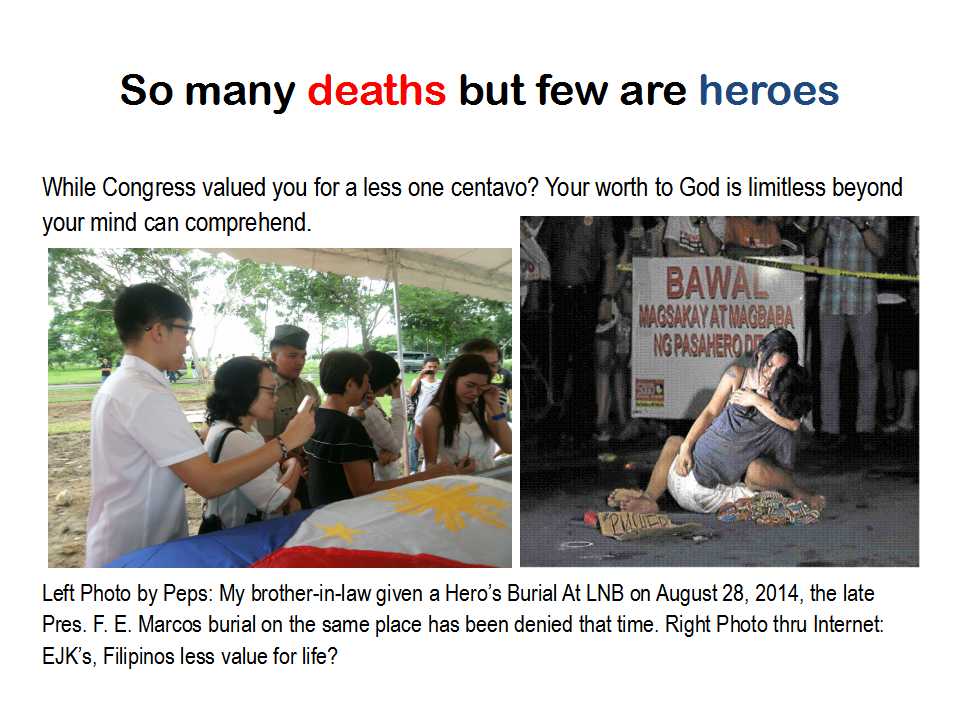
When the Philippine Congress valued YOU and me at P1,000.00 for giving the Commission of Human Rights (CHR), a constitutional body under our present Constitution, I could not help but
to heave a deep sigh of the legislators’ ignorance of the true value of human life.
And your congressman who voted for yes is valued less than once centavo as well. No wonder so many deaths but few are heroes.
Judas’ estimate
Christ Jesus meanwhile was valued by Judas for 30 pieces of silver. The thirty (30) pieces of silver was the price or estimation of Judas Iscariot when betrayed Jesus, his own Master. (Matthew 26:15 )
So the 30 pieces of silver are about 5-week money (based on a 6 day working week.) In terms of purchasing power, each silver piece was probably worth about $20. So since the standard of living is much lower than in modern (Western) societies, the thirty pieces are worth about $600 (P33,000.00 ) at prevailing current price today.
Like Judas who sold his Master Jesus Christ for 30 pieces of silver, is it your congressman and my congressman followed the footstep of Judas for selling their master for less than one centavo?
Treason?
Should a servant must betray his own master? Would it be a treason (technically speaking)?
Crispino de Castro, co-author of 1986 Constitution observed that, “We see arrogance and discourtesy in the government offices forgetting that public officers and employees are servants of the people and their masters are the people (Page 14).”
“The prime duty of the Government is to serve and protect the people,” – Article II, Section. 4.
God’s estimate
While Morowitz valued you at $6-M, and Constanza, an economist valued you at $54-Trillion, while the Congress of the Philippines led by House Speaker Pantaleon Alvarez and the legislator who represents you at LESS THAN ONE CENTAVO out of 1,000 people, how much is your worth from the very eyes of God. And to God how much is your worth to Him?
This is how much you valued to God.
Jesus Christ is the incarnated Word of God, equal to God as co-Creator who chosen to become flesh (John 1:1-2; 14). Jesus eternal value never diminished a bit even when He chose do die for you and me. When God the Father gave up His son for us (John 3:16), He have given up the entire resource of the infinite universe and eternal time (Hebrew “olam)’) who was the same yesterday, today and forever. He also claimed to the first and the last, the alpha and omega.
Tell me how much is your worth to Him? Non-negotiable. It is simply indescribably impossible to estimate or comprehend. The cost is not even existing in our time and in the time to come.
Like horse-racing
The so-called “chariot-racing” following by the chorused chanting of the word, “Nika! Nika! Nika” in this very Hippodrome resulted to riot, then to violence, then to rebellion, then to treason against Emperor Justinian in 532 A.M.
(picture5)
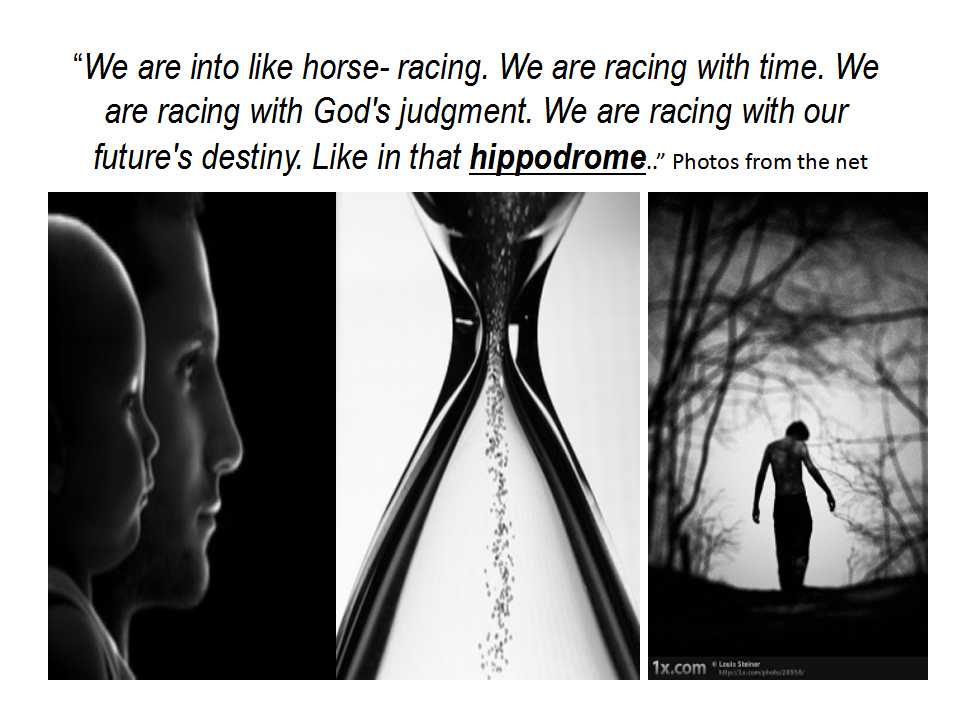
Going back to the word “Hippodrome” that I heard last September 5, 20017. This is what it meant: “We are into like horse- racing. We are racing with time. We are racing with God's judgment. We are racing with our future's destiny. Like in that hippodrome. Either we win or lose. But God want us to chant " Nika! Nika! Nika!" What does it means of such a chant?
All the Seven Churches of Asia were encouraged with the Lord by this very same word, “NIKA!” Why? Because the clouds of witnesses are watching over us how we run this race of time and the race of judgment. This race is meant a race for survival!
Nika in KJV means “to overcome.” Nika in Greek “nikao” means “to conquer, to carry off the victory; of Christ, victories over all His foes,” and not the least, “of Christians, to hold fast their faith even unto death against the power of their foes and temptations and persecutions.”
It says in the Book of the End of End is this “He that overcometh..” (Rev. 2:7, 11; 17, 26, 3:5, 12, 21
And the Lord must prevail. And may Lord triumph over evil. Like that hippodrome where 100,000 spectators watch for the race, we too, have far more over than 100,000 spectators that's this hippodrome can accommodate. These are the saints in the past and in our future time who perished as martyrs (witnesses in Greek “martus”). They run for their race and became victories even unto imprisonment, torture, and death.
The spectacle is about to begin in the coming end. It is in fact, the beginning of the end where you and will become a spectacle both to the Christians (even the false ones) and to non-Christians where our faith will be tested.
(picture6)

The Congress Final Reading of the Bill “Anti-SOGIE” as published by a newspaper last September 20 is a moral battle we have to face. Sooner, the BBL will soon to become a “law.” That will be another foe, a spiritual battle on freedom of expressions and freedom of rights.
Shall we soon be seeing pastors, Christians and moralists being dragged, handcuffed, imprisoned and be branded as “criminals”? And should the “death penalty” will be recalled, then the “martus” shall rise up.
With these two “laws” when combined in the fullest force of the “law” (take note of this sign “ “), the end shall begin. And many will “fall away” (apostasy) as the writer of Hebrews warned.
He said, "We are surrounded with a cloud of many witnesses, let us therefore run in a race that was set before us and we must run with patience," Hebrews 12:1).” Just like in Colosseo, one will be tested whether he can endure or not. AND WHO CAN ENDURE? But only those who have the right focus that says ……
“Looking unto Jesus, the author and the finisher of our faith,” - Hebrews 12:2
(picture7)
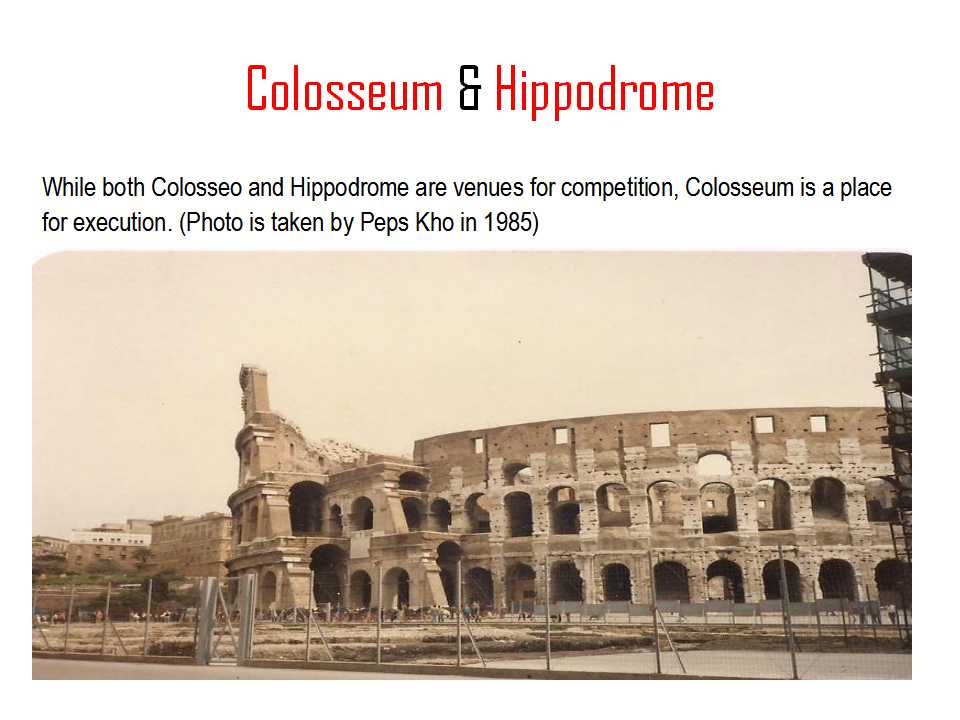
NOTES:
-
Inmate’s Testimony: Bro. Vernas (not his real) lamented a while ago that he has been languishing in this jail for the past 7 years for a crime or sin that he did not commit. I asked myself, “Why should I have to pay for someone else’s crime?” No way! But when I had this thought in mind I remembered Christ? Why the Lord Christ has been meted the death penalty for sins He Himself did not commit? Why other else’s crimes was imputed on Him?
Like you and some other who are truly innocent (for whatever reason) have was arrested, jailed and suffering for someone else’s sins?
-
The drug addict. I am not promoting drug using or drug pushing. But the word “sinner” in Luke 15:10 is a generic in Greek “hamartolos” which means “devoted to sin” or “pre-eminently sinful.” He who sells drugs and he who shoots a drug addict to death are generically “sinners.”
-
The Hippodrome of Constantinople
The Hippodrome of Constantinople was a circus that was the sporting and social centre of Constantinople, capital of the Byzantine Empire. Today it is a square named Sultan Ahmet Meydanı (Sultan Ahmet Square) in the Turkish city of Istanbul, with a few fragments of the original structure surviving.
The word hippodrome comes from the Greek hippos i.e. horse, and dromos i.e. path or way. For this reason, it is sometimes also called Atmeydanı ("Horse Square") in Turkish. Horse racing and chariot racing were popular pastimes in the ancient world and hippodromes were common features of Greek cities in the Hellenistic, Roman and Byzantine eras.
Although the Hippodrome is usually associated with Constantinople's days of glory as an imperial capital, it actually predates that era. The first Hippodrome was built when the city was called Bysantium, and was a provincial town of moderate importance. In AD 203 the Emperor Septimius Severus rebuilt the city and expanded its walls, endowing it with a hippodrome, an arena for chariot races and other entertainment.
In AD 324, the Emperor Constantine the Great decided to move the seat of the government from Rome to Byzantium, which he renamed Nova Roma (New Rome). This name failed to impress and the city soon became known as Constantinople, the City of Constantine. Constantine greatly enlarged the city, and one of his major undertakings was the renovation of the Hippodrome. It is estimated that the Hippodrome of Constantine was about 450 m (1,476 ft) long and 130 m (427 ft) wide. Its stands were capable of holding 100,000 spectators.
Source: https://en.wikipedia.org/wiki/Hippodrome_of_Constantinople
-
Serpentine Column, The Serpentine Column was originally housed in the Temple of
Apollo, Delphi, Greece. I was in Delphi at least once in my lifetime where I met one of the Holocaust survivor Armenian Mrs. Assatorian of New York City in 1985.
"Three-headed Serpent" according to historian Herodotus through A. D. Godley, Harvard University (1920) is lso known as the Serpentine Column, Plataean Tripod or Delphi Tripod, is an ancient bronze column at the Hippodrome of Constantinople (known as Atmeydanı "Horse Square" in the Ottoman period) in what is now Istanbul, Turkey. It is part of an ancient Greek sacrificial tripod, originally in Delphi and relocated to Constantinople by Constantine the Great in 324. It was built to commemorate the Greeks who fought and defeated the Persian Empire at the Battle of Plataea (479 BC). The serpent heads of the 8-metre (26 ft) high column remained intact until the end of the 17th century (one is on display at the nearby Istanbul Archaeology Museums) according to Istanbul Governor’s official website.
The Serpentine Column has one of the longest literary histories of any object surviving from Greek and Roman antiquity – its provenance is not in doubt and it is almost 2,500 years old. Together with its original golden tripod and cauldron (both long missing), it constituted a trophy, or offering reminding of a military victory, dedicated to Apollo at Delphi. This offering was made in the spring of 478 BC, several months after the defeat of the Persian army in the Battle of Plataea (August 479 BC) by those Greek city-states in alliance against the Persian invasion of mainland Greece, during theGreco-Persian Wars. Among the writers who allude to the Column in the ancient literature are Herodotus, Thucydides, pseudo-Demosthenes, Diodorus Siculus, Pausanias the traveller, Cornelius Nepos and Plutarch. The removal of the column by the Emperor Constantine to his new capital, Constantinople, is described by Edward Gibbon, citing the testimony of the Byzantine historians Zosimus, Eusebius, Socrates, and Sozomenus.
The invasion, a combined land and sea expedition, which began in 480 BC, fell under the command of the king himself, Xerxes I of Persia, and his brother-in-law and cousin Mardonius, who had been a close confidant of Xerxes' father, Darius I of Persia.
The ancient Egyptian goddess Renenutet, who often appeared in the form of a hooded cobra.[
Serpent Association
The Uraeus plural Uraeuses in Greek is from Egyptian "rearing cobra" is the stylized, upright form of an Egyptian cobra (asp, serpent, or snake), used as a symbol of sovereignty, royalty, deity and divine authority in ancient Egypt. The Uraeus is a symbol for the goddess Wadjet
according to Dictionary.com. 2012. Retrieved July 13, 2012 and “Egyptian-Gods.”
"Snake goddess" is the name commonly given to a type of figurine depicting a woman holding a snake in each hand, as were found in Minoan archaeological sites in Crete. The first two of such figurines (both incomplete) were found by the British archaeologist Arthur Evans and date to the neo-palatial period of Minoan civilization, ca. 1700–1450 BCE. It was Evans who called the larger of his pair of figurines a "Snake Goddess", the smaller a "Snake Priestess"; since then, it has been debated whether Evans was right, or whether both figurines depicts priestesses, or both depict the same deity or distinct deities according to Daniel Ogden (2013), “Drakon: Dragon Myth and Serpent Cult in the Greek and Roman Worlds.” Oxford University.
The serpent is often symbolically associated with the renewal of life because it sheds its skin periodically. A similar belief existed in the ancient Mesopotamians and Semites, and appears also in Hindu mythology according to Clumbia,free.dictionary. The Pelasgian myth of creation refers to snakes as the reborn dead. However, Nilsson noticed that in the Minoan religion the snake was the protector of the house, Zeus Kresios in the guise of a snake is regarded the "protector of storehouses". A snake is the "good daemon" at the temple of Athena on Acropolis,etc: Martin Nilsson (1967). Die Geschichte der Griechische Religion Vol I . C.H. Beck Verlag Munchenas it later appears also in Greek religion. Biblically, Apolyon is the god of the abyss also known as Hades as the protector the underground wealth.
Historian Herodotus, “History” says that Wadjet had a famous oracle in the city Per-Wadjet (Greek name Buto). According to Herodotus this may have been the source of the oracular tradition which spread to Greece from Egypt. The serpents were considered the protectors of the temples and the chthonic masters of the ancient earth goddess. In Greece the old oracles were devoted to the mother goddess. According to a Greek legend Apollo came to Delphi carrying Cretan priests, and there he possessed the oracle after slaying the serpent Python, the daughter of Gaia.
The snake is also associated with Ariadne; the Snake worship in Hindu mythology; Gorgon - female monsters with sharp fangs and hair of living, venomous snakes in Greek mythology.; Astarte; the ancient god of Mesopotamia Ishtar which is related to Al-Lat and Al-Manat; Wadjet; among others. This snake can be found in Genesis 3 when the serpent tempted Eve.
The association of this “snake” can be explained in the website of www.clsfrosales.com CLICK “Ares, the god of war; is this war?”
-
1 Samuel 24:1-17 (New Life Version or NLV)
When Saul returned from following the Philistines, he was told, “See, David is in the desert of Engedi.” 2 Then Saul took 3,000 chosen men from all Israel, and went to find David and his men in front of the Rocks of the Wild Goats. 3 He came to the places where the sheep were kept on the way. There was a cave there, and Saul went in to get rid of his body waste. Now David and his men were sitting farther back in the cave. 4 David’s men said to David, “See, this is the day the Lord told you, ‘See, I am about to give the one who hates you into your hand. You will do to him what you think is best.’” Then David got up and cut off a piece of Saul’s clothing in secret. 5 After this, David felt guilty in his heart because he had cut off a piece of Saul’s clothing. 6 So he said to his men, “May the Lord not let me put out my hand against my leader, for he is the Lord’s chosen one.” 7 David stopped his men with these words. He did not let them go against Saul. So Saul stood up and left the cave, and went on his way.
8 After this David got up and went out of the cave and called to Saul, saying, “My lord the king!” When Saul looked behind him, David put his face to the ground, showing much respect. 9 David said to Saul, “Why do you listen to the words of men who say, ‘David wants to hurt you’? 10 See, your eyes have seen how the Lord gave you to me today in the cave. Some told me to kill you, but I had pity on you. I said, ‘I will not put out my hand against my leader, for he is the Lord’s chosen one.’ 11 Now, my father, see the piece of your clothing in my hand. I cut off the piece of your clothing but did not kill you. So know and understand that I have no desire to do wrong to you. I have not sinned against you, yet you come wanting to kill me. 12 May the Lord judge between you and me. May He punish you for your action against me. But my hand will not be against you. 13 As the men of long ago said in their wisdom, ‘Out of the sinful comes sin,’ but my hand will not be against you. 14 After whom has the king come out? After whom are you running? After a dead dog? After a little bug? 15 May the Lord be the One to judge between you and me. May He see and help me, and save me from you.” 16 When David had finished speaking to Saul, Saul said, “Is this your voice, my son David?” Then Saul gave a loud cry. 17 He said to David, “You are more right and good than I. For you have brought good to me, while I have done wrong to you.
-
The Olympiad
The Olympiad was one of the ways the Greeks measured time. The Olympic Games were used as a starting point, year one of the cycle; the Nemean and Isthmian Games were both held (in different months) in year two, followed by the Pythian Games in year three, and then the Nemean and Isthmian Games again in year four. The cycle then repeated itself with the Olympic Games. They were structured this way so that individual athletes could participate in all of the games.
(But note that the dial on the Antikythera mechanism - [1] - seems to show that the Nemean and Isthmian Games did not occur in the same years.)
Participants could come from all over the Greek world, including the various Greek colonies from Asia Minor to Spain. However, participants probably had to be fairly wealthy in order to pay for training, transportation, lodging, and other expenses. Neither women nor non-Greeks were allowed to participate, except for very occasional later exceptions, such as the Roman emperor Nero.
The main events at each of the games were chariot racing, wrestling, boxing, pankration, stadion and various other foot races, and the pentathlon (made up of wrestling, stadion, long jump, javelin throw, and discus throw). Except for the chariot race, all the events were performed nude.
The Olympic Games were the oldest of the four, said to have begun in 776 BC. It is more likely though that they were founded sometime in the late 7th century BC. They lasted until the Christian Emperor Theodosius abolished them in AD 393. The Pythian, Nemean and Isthmian games most likely began sometime in the first or second quarter of the 6th century BC. The Isthmian games were held at the temple to Poseidon on the Isthmus of Corinth.
The games are also known as the stephanitic games, because winners received only a garland for victory. (Stephanitic derives from stephanos the Attic Greek word for crown.) No financial or material prizes were awarded, unlike at other Ancient Greek athletic or artistic contests, such as the Panathenaic Games, at which winners were awarded many amphorae of first-class Athenian olive-oil. The Olympic games awarded a garland of olives; the Pythian games, a garland of laurel, i.e. bay leaves; the Nemean games, a crown of wild celery, and the Isthmian, a garland of pine leaves in the archaic period, one of dried celery in the Classical and Hellenistic periods, and again one of pine from then on.[1] Though victors received no material awards at the games, they were often showered with gifts and honors on returning to their polis.
P1,000-budget for CHR? How did your Reps vote? Here’s a partial list – and why there’s no full list (yet) : By News5-InterAksyon | September 12, 2017, 7:23 PM
Photo by Boy Santos, Philippine Star
The House of Representatives on Tuesday voted 119-32 to endorse a P1,000-budget for the Commission on Human Rights. The matter now goes to a bicameral committee to be joined in by members of the Senate.
Whom in the House of Representatives voted for or against the move to slash the CHR’s budget? Not even House leaders could immediately say, as individual congressmen were literally lost in the crowd.
House plenary staff, pressed by media immediately after the vote, said they did not list down how individual congressmen voted because legislators were called merely to stand for a headcount after a viva voce vote – a shout of “Aye” or “Nay” – was deemed inconclusive. (Apparently, though very much outnumbered, those who voted against the move to curtail the CHR funds for 2018, were at least much louder in the first attempt to divide the House.)
Majority Leader Rodolfo Farinas could only affirm: “There is no such record as voting was by ‘ayes’ and ‘nays’, which was ultimately done…when the ‘nays’ challenged the ruling of the chair that the ‘ayes’ had it. [So] 112 members stood to register an ‘aye’ vote, while 39 stood to vote against the motion.”
As Congress staff and media try to identify those who voted No from video footage, here, unofficially, is a list of 30 legislators who House staff said were among the 32 who voted against the P1,000-budget for the Commission on Human Rights. We will update as we confirm more names:
1.Gary Alejano (Magdalo partylist)
2.Lito Atienza (Buhay partylist)
3.Kaka Bag-ao (Dinagat Island)
4.Jorge Banal (Quezon City)
5.Kit Belmonte (Quezon City)
6.Emmanuel Billones (Capiz)
7.Gabriel Bordado (Camarines Sur)
8.Arlene Brosas (Gabriela partylist)
9.Wilfredo Caminero (Cebu)
10.Ariel Casilao (Anakpawis partylist)
11.France Castro (Gabriela partylist)
12.Raul Daza (Northern Samar)
13.Emmi De Jesus (Gabriela)
14.Raul Del Mar (Cebu)
15.Sarah Jane Elago (Kabataan partylist)
16.Bayani Fernando (Marikina)
17.Lawrence Fortun (Agusan del Norte)
18.Mark Go (Baguio City)
19.Edcel Lagman (Albay)
20.Jocelyn Limkaichong (Negros Oriental)
21.Evelyn Mellana (Agusan del Sur)
22.Rosenda Ann Ocampo (Manila)
23.Aileen Radaza (Lapu-lapu City)
24.Ramon Rocamora (Siquijor)
25.Bai Sandra Sema (Maguindanao/Cotabato City)
26.Antonio Tinio(Act Teachers)
27.Tom Villarin(Akbayan partylist)
28.Rosanna Vergara (Nueva Ecija)
29.Carlos Zarate (Bayan Muna partylist)
30.Manuel Zubiri (Bukidnon)
Nika Revolt, Constantinople
On January 13, 532, when the chariot races were scheduled to begin, members of both the Blues and the Greens loudly pleaded with the emperor to show mercy to the two men that Fortune had rescued from the gallows.
When no response was forthcoming, both factions began to cry out, "Nika! Nika!" The chant, so often heard in the Hippodrome in support of one charioteer or another, was now directed against Emperor Justinian.
The Hippodrome erupted in violence, and soon the mob took to the streets. Their first objective was the praetorian, which was, essentially, the headquarters of Constantinople's police department and the municipal jail. The rioters released the prisoners and set the building on fire. Before long a substantial portion of the city was in flames, including the Hagia Sophia and several other great buildings according to Melissa Snell (2017)
Anti-SOGIE
House OKs LGBT anti-discrimination bill on final reading
By: Marc Jayson Cayabyab - Reporter / @MJcayabyabINQ
INQUIRER.net / 05:24 PM September 20, 2017
